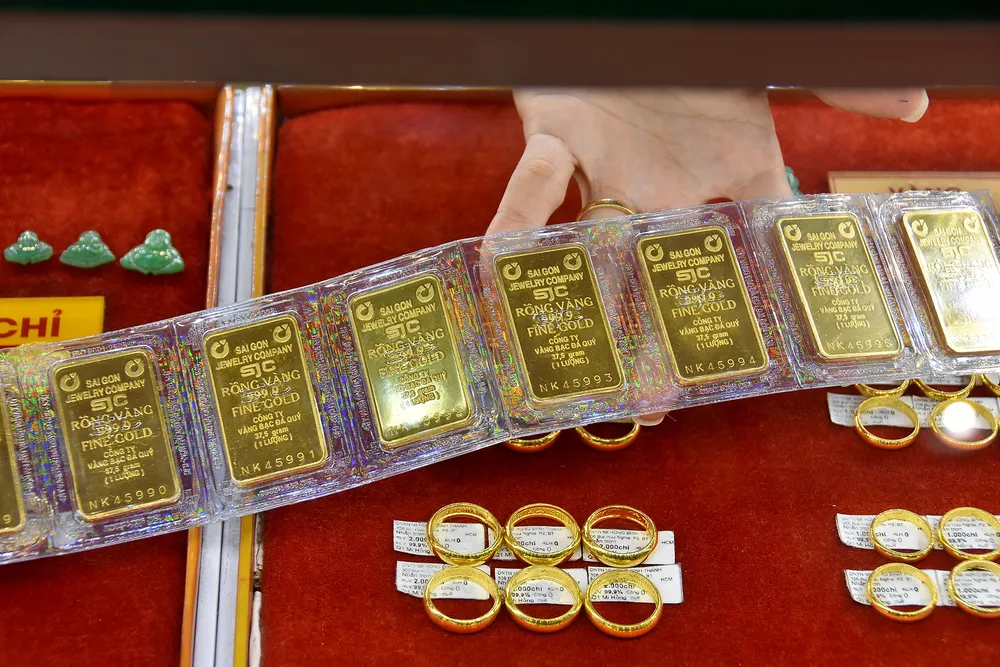
JOURNALIST: - Sir, with the recent continuous rise in the gold market and the government addressing the issue, what are your thoughts on this matter?
DR. NGUYỄN TRÍ HIẾU: - Over a decade ago, the government initiated a campaign against goldization, leading to the issuance of Decree 24/2012. This effort successfully prevented gold from becoming a means of payment, curbing people's ability to invest and speculate in gold and ultimately stabilizing the gold market until now. It was indeed an accomplishment. However, it is crucial to reassess this issue from a different perspective, given the significant changes in the economy and business environment. The purposes for which people use gold or invest in gold have evolved. Gold is now viewed as a savings or investment channel, alongside other options such as bank deposits, stocks, real estate, and bonds.
In the past decade, the State Bank has refrained from granting licenses for gold imports and has not produced more SJC gold bars. The consequence of this limited supply is that the market dictates the difference between domestic and world gold prices, fluctuating between VND 10 million and, at times, up to VND 20 million per tael. Domestic gold ring prices, after closely mirroring world prices for many years, have also begun to exhibit a widening difference. The rise in gold smuggling can be attributed to the substantial difference in gold prices between domestic and international markets. This indicates that the regulatory tightening and control implemented by the management agency, aiming to stabilize the macroeconomy through Decree 24/2012, can only address the issue in the short term and lacks meaningful impact in the long term.
- Currently, the Government has tasked the State Bank of Vietnam with proposing effective solutions for managing the gold market in the new situation. In your opinion, what solution would be effective?
- In my view, amending Decree 24/2012 is essential. Specifically, I propose two amendments. Firstly, the State Bank should be the only entity in Vietnam authorized to import gold, delegating gold importation to reputable companies with sufficient financial capacity. The State Bank should refrain from being a gold trader (engaging in buying and selling) and return to its role of overseeing the gold market through other optimal measures. In major global economies, Central Banks typically do not directly manage gold trading, treating gold solely as a common commodity and coordinating it as an asset for national reserves.
Secondly, the monopoly of the national gold brand, SJC, should be abolished to foster fairness for all products in the market. The monopoly status of SJC prioritizes it in the gold market, hindering perfect competition. Over time, the State Bank of Vietnam has not produced additional gold bars, resulting in demand without an adequate supply. Consequently, when demand surges, gold businesses can manipulate prices by buying and selling, and the inability to purchase can drive up prices, eroding the market's stability.
After eliminating these two monopoly points, additional measures are necessary to stabilize the market. This involves establishing a gold trading platform where all gold traders and investors can register. This platform would ensure public and transparent disclosure of information related to quantity, gold prices, and activities of market participants.
- But sir, there are concerns and mixed reactions about the establishment of a national gold exchange, citing potential risks. What is your perspective on these issues?
- From my standpoint, if the issues of monopoly and import can be addressed, establishing a national gold exchange managed by the State Bank of Vietnam to create a true market economy playing field is imperative. This gold exchange would resemble metal exchanges in other countries or domestic stock exchanges and would undergo development in stages, starting with physical gold and then progressing to account gold. The gold exchange would be accessible only to registered individuals, specifically gold traders and investors, and significant transactions would be conducted exclusively on the trading floor. On this platform, price fluctuations and buying and selling activities would be transparent, allowing people to monitor them.
Addressing speculative concerns, whether there is an exchange or not, gold speculation remains present in the market. However, in the absence of a gold exchange, if an investor were to purchase a substantial amount of gold, the market would experience significant fluctuations with no visibility on the trader's identity or the amount involved. At times, the government or the State Bank might need to intervene to stabilize the situation. With the presence of an exchange, information becomes public, limiting gold speculation as price manipulation can be subject to legal consequences.
- What are your forecasts regarding the developments in gold prices in the near future?
- This year, it is anticipated that domestic gold prices may reach VND 82 million per tael, while world gold prices may reach USD 2,100 per ounce. In the absence of government intervention or amendments to Decree 24/2012, the market could potentially achieve a more balanced and stable state. However, it is likely that gold prices will continue to rise, given that domestic gold prices tend to follow the trend of world gold prices. When there is a substantial increase in global gold prices, Vietnam's gold prices cannot remain unaffected. Failing to adjust domestic gold prices could lead to the outflow of domestic gold through smuggling. Presently, the geopolitical uncertainties, including the US presidential election, and crises in regions such as Ukraine and the Middle East, contribute to the expectation of a rise in gold prices.
- Thank you very much.




















